Enhanced awareness and efforts from businesses to reach climate goals
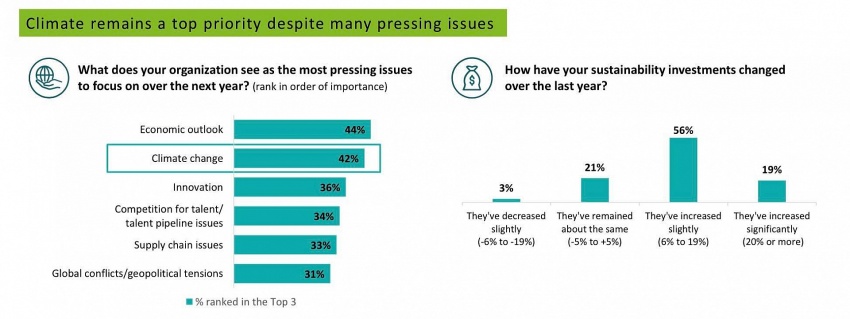 |
Amidst a year of continued uncertainty, disruption, and competing business challenges, leaders ranked the threats posed by climate change as a top issue in Deloitte’s global C-suite (CxO) survey last week, second only to the economic outlook.
The majority of CxOs remain optimistic that the world will take sufficient steps to avoid the worst impacts of climate change, and agree with the sense of urgency to act. Despite an uncertain economic cycle in the year to come, C-suite leaders remain committed to investing in sustainability and in climate change initiatives. Furthermore, there is a broad recognition that progress towards solutions will require collaboration across the entire ecosystem of private, public, and non-profit organisations.
Nikki Neuburger, chief brand officer at lululemon said, “The disruption of the past few years has exposed cracks in the world’s systems and shown us the things that need to be addressed. Focusing on the planet and contributing to a more restorative future not only makes us more resilient and flexible, but it’s also the right and only thing to do.”
Climate change ranked ahead of seven focus areas, including innovation, competition for talent, and supply chain challenges. In fact, only the economic outlook ranked slightly higher. Many of them said climate change will have a significant impact on their organisation’s strategy and operations over the next three years, with some stating they have increased their sustainability investments over the past year.
Daniel Hanna, global head of sustainable finance at Barclays said, “While it might seem like the shocks of the last couple of years would impact the climate ambitions, corporates and institutions continue to take progressive action. On the positive side, we’re seeing significant momentum in terms of the flow of capital into renewables and new decarbonisation technologies.”
CxOs also identified climate change as a driver of the high costs and resource scarcity recently. Firms are also contending with changes in consumer demand, regulations, political uncertainty, and operational impacts related to climate disasters and weather events. Resource scarcity is most keenly felt in the UAE (64 per cent), Germany (58 per cent), France (55 per cent), and the Americas.
Chief sustainability officer at Standard Chartered Marisa Drew stated, “I am equal parts optimistic and concerned. On the positive side, with the work I do, I have the privilege to see the changes that are beginning to happen in the sustainability arena. I see adaptation beginning to scale in places like South Africa, for instance, where there were hardly any solar panels to be seen a few years back. Now, everywhere you look, homes and businesses are being powered by the natural abundance of solar energy. So, the power of human resilience in the face of challenges gives me hope.”
Patrick Sochnikoff, global chief diversity, equity, and inclusion officer and group senior vice president of corporate and social responsibility at Sodexo said, “There are many promising signals. Behaviours are shifting and people and companies want to reduce their footprints. There are joint targets, objectives, and efforts, and the momentum is just amazing. The journey will be long and the road bumpy, but I am confident we’ll get there by embarking on a constructive and enjoyable journey. Together, we’ll have the courage to make changes from a business and political perspective.”
Companies are feeling a moderate-to-large degree of pressure to act on climate change from many different stakeholder groups, from board and management level to customers and staff. The workforce has become an increasingly influential group, with more than half of CxOs saying employee activism on climate matters has led their organisation to increase sustainability actions over the last year, and 24 per cent stating that it has led to a significant increase.
Mary Jacques, director of Global environmental, social, and governance (ESG) at Lenovo said, “Customers across regions have high expectations for the products they purchase and companies they choose to do business with. ESG metrics are an increasingly important part of their decision-making process. They also want the most value out of our products, which means looking at circular processes to extend product life, making products repairable, and offering solutions like asset recovery services that make recycling easier.”
Natalie Knight, CFO at Ahold Delhaize added, “Stakeholder interest has skyrocketed on sustainability topics over the past two years, and this interest has been very valuable for us because it has challenged us to take on more responsibility where we believe there is a big opportunity. It has accelerated our thinking.”
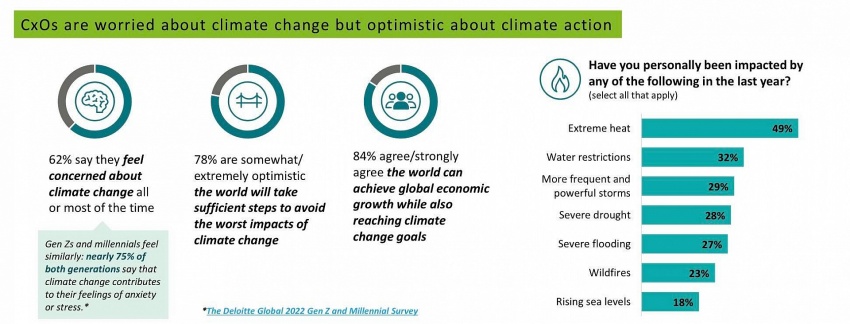 |
Deloitte’s report offers several recommendations to help CxOs get started, including embedding climate goals into their enterprise’s overall strategy and purpose, building trust by taking credible climate action, empowering the board, encouraging stakeholder action, investing in today’s (and tomorrow’s) technologies, and collaborating to drive system-level change.
In Vietnam, Nestlé has been one of the first signatories to the United Nations’ commitment to net-zero by 2050. The company has been working with the government, supporting Vietnam’s 2050 net-zero emissions goal announced at COP26.
David Rennie, deputy executive vice president and head of Nestlé Coffee Brands said, "We are absolutely united in our ambition to achieve this. If we want to make a difference, we must act immediately. To facilitate the goal, we have just launched Nescafé Plan 2030 with a focus on seven key regions, including Vietnam, from where our brand sources 90 per cent of its coffee. Regenerative agriculture is positioned right at the heart of this programme."
"Under the scheme, Nestlé has made clear commitments to fulfil its emissions goals, including halving them by 2030. We’re going to cut emissions by 20 to 25 per cent in three years, which is indeed a huge commitment. Therefore, Nestlé has to implement genuine programmes, real pledges, and assistance for farmers and rural communities – including those in Vietnam – to bring about the changes," he stated.
Some other Vietnamese enterprises have been carrying out practical activities to mitigate climate change and achieve net-zero. Following the e-buses, VinFast has just launched a new green taxi brand, and hundreds of electric cars have been plying the streets to compete with the old and high-emission taxies. The majority of supermarkets are using biodegradable plastic bags, and numerous shops and restaurants are using boxes made from recycled materials.
The Vietnamese government is committed to tackling the challenges related to and meeting the targets set by the current draft of the nation’s Power Development Plan VIII composed by the Ministry of Industry and Trade, the country's National Strategy on Green Growth, and its action plans set forth by the Ministry of Planning and Investment.
 | Green finance and technology solutions for net-zero emissions As climate change has become a serious international issue, many countries have taken action to reduce greenhouse gas emissions and achieve net-zero emissions by 2050. In Vietnam, the government has made a tremendous effort to combat climate change by ratifying the Paris Climate Agreement in 2016, pursuing the National Green Growth Strategy for 2021-2030, and implementing the Law on Environmental Protection which came into effect at the beginning of 2022. |
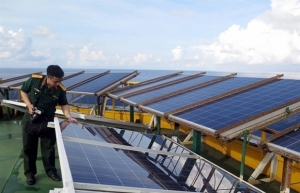 | Vietnam to complete policies, laws for sustainable energy development Experts discussed the implementation of policies and laws on energy development in the 2016-2021 period at a conference co-organised by the Vietnam Union of Science and Technology Associations (VUSTA) and the National Assembly (NA)'s Committee for Science, Technology and Environment (CSTE) in Hanoi on March 5. |
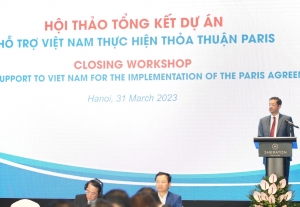 | Vietnam aggressively implementing the Paris Agreement Vietnam is aggressively integrating solutions to mitigate the effects of climate change, with the aim of achieving net-zero emissions by 2050. |
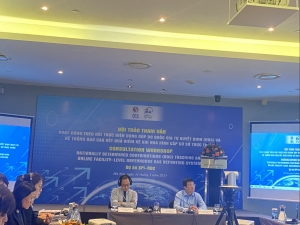 | Vietnam operates greenhouse gas reporting system online A reporting system for facilities to upload their greenhouse gas (GHG) emissions data online has been completed, and will be updated when the Ministry of Industry and Trade, the Ministry of Construction, and the Ministry of Transport issue detailed guidance for their respective areas, according to a recent consultation meeting. |
What the stars mean:
★ Poor ★ ★ Promising ★★★ Good ★★★★ Very good ★★★★★ Exceptional
Related Contents
Latest News
More News
- VinaCapital launches Vietnam's first two strategic-beta ETFs (February 26, 2026 | 09:00)
- PM sets five key tasks to accelerate sci-tech development (February 26, 2026 | 08:00)
- PM outlines new tasks for healthcare sector (February 25, 2026 | 16:00)
- Citi report finds global trade transformed by tariffs and AI (February 25, 2026 | 10:49)
- Vietnam sets ambitious dairy growth targets (February 24, 2026 | 18:00)
- Vietnam, New Zealand seek level-up in ties (February 19, 2026 | 18:06)
- Untapped potential in relations with Indonesia (February 19, 2026 | 17:56)
- German strengths match Vietnamese aspirations (February 19, 2026 | 17:40)
- Vietnam’s pivotal year for advancing sustainability (February 19, 2026 | 08:44)
- Strengthening the core role of industry and trade (February 19, 2026 | 08:35)

 Tag:
Tag:




















 Mobile Version
Mobile Version